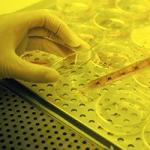
Research Topics
Understanding the Biology of KRAS Mutant Cancer
We use genetic, molecular, pharmacological tools to study how the KRAS oncogene maintain the tumorigenic state in lung, colorectal and pancreatic cancer cells. We are particularly focused on dissecting mechanism of non-oncogene addiction in KRAS mutant cells that plays a critical role in alleviating oncogenic stress. Our work provides rationale for targeting non-oncogene addiction as a therapeutic strategy for the treatment of KRAS mutant cancer.
Non-Oncogene Addiction in KRAS Mutant Cancer
Oncogene addiction describes the cancer cell’s dependency on its driver mutation to maintain the tumorigenic state. Non-oncogene addiction describes the cancer cell’s dependency on stress-response pathways to suppress oncogenic stress and maintain viability. We were among the first to carry out synthetic lethal screens to identify non-oncogene addiction in KRAS mutant cancer cells. Our work has demonstrated that KRAS mutant cells exhibit non-oncogene addiction to multiple stress-response pathways that maintain chromosome stability, mRNA splicing, protein SUMOylation and autophagy for survival. Many of these stress-response pathways are potentially druggable.
3D In Vitro Models of KRAS Mutant Cancer
Although 2-dimensional cell culture has traditionally been a useful method to study cancer cell behavior, this model does not capture the anchorage-independent nature of cancer cell growth. We are developing scalable 3-dimensional (3D) culture models of tumor spheroid and lung organoid as an alternative and better approach to model KRAS mutant cancer in vitro. Co-culture of tumor cells with fibroblasts in these 3D models enable the characterization of tumor-stroma interaction. We are using CRISPR gene editing and chemical biology approaches in these 3D models to discover non-oncogene addiction mechanism that are critically required for the anchorage-independent growth of cancer cells.
New Therapeutic Strategies in KRAS Mutant Cells
We have developed combinatorial RNAi and CRISPR technologies to systematically interrogate the patterns of oncogene and non-oncogene addiction in KRAS mutant cells. We are exploring therapeutic potential of inhibitors targeting non-oncogene addiction pathways, oncogenic KRAS signaling in preclinical models to identify better therapeutic strategies for KRAS mutant cancer. Ultimately, we aim to translate our discoveries into better treatment outcomes for patients with KRAS mutant cancer.
Biography
Ji Luo received his B.A. in Natural Sciences from the University of Cambridge, UK in 1998. He completed his Ph.D. training as an HHMI Predoctoral Fellow in the laboratory of Dr. Lewis Cantley at Harvard University, Boston. His Ph.D. research focused on the role of PI 3-kinase in development, diabetes and cancer. Ji Luo undertook his postdoctoral training as an AACR Fellow in the laboratory of Dr. Stephen Elledge at Harvard Medical School, Boston. His postdoctoral research focused on the development of bar-coded shRNA library technologies for genome-wide RNAi synthetic lethal analysis in cancer cells. He received tenure at NIH in 2019.
Selected Publications
- Read A, Gao S, Batchelor E, Luo J. Flexible CRISPR library construction using parallel oligonucleotide retrieval. Nucleic Acids Res. 2017;45(11):e101.
- Yu B, Swatkoski S, Holly A, Lee LC, Giroux V, Lee CS, Hsu D, Smith JL, Yuen G, Yue J, Ann DK, Simpson RM, Creighton CJ, Figg WD, Gucek M, Luo J. Oncogenesis driven by the Ras/Raf pathway requires the SUMO E2 ligase Ubc9. Proc Natl Acad Sci U S A. 2015;112(14):E1724-33.
- Yuan TL, Fellmann C, Lee CS, Ritchie CD, Thapar V, Lee LC, Hsu DJ, Grace D, Carver JO, Zuber J, Luo J, McCormick F, Lowe SW. Development of siRNA payloads to target KRAS-mutant cancer. Cancer Discov. 2014;4(10):1182-1197.
- Weng MT, Lee JH, Wei SC, Li Q, Shahamatdar S, Hsu D, Schetter AJ, Swatkoski S, Mannan P, Garfield S, Gucek M, Kim MK, Annunziata CM, Creighton CJ, Emanuele MJ, Harris CC, Sheu JC, Giaccone G, Luo J. Evolutionarily conserved protein ERH controls CENP-E mRNA splicing and is required for the survival of KRAS mutant cancer cells. Proc Natl Acad Sci U S A. 2012;109(52):E3659-67.
- Luo J, Emanuele MJ, Li D, Creighton CJ, Schlabach MR, Westbrook TF, Wong KK, Elledge SJ. A genome-wide RNAi screen identifies multiple synthetic lethal interactions with the Ras oncogene. Cell. 2009;137(5):835-48.
Related Scientific Focus Areas
This page was last updated on Monday, June 30, 2025




